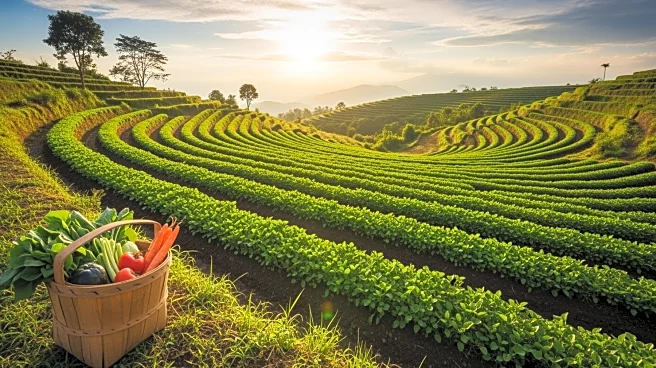What's Happening?
Mozambique is aiming to transition from subsistence agriculture to income-generating farming, as stated by Jaime Chissico, the national director of Cooperation and Investment at the Ministry of Agriculture.
This shift is part of a broader strategy to enhance production and productivity, despite challenges such as climate change, financing, and agricultural research. The country is focusing on defining value chains for maize, poultry, soya, legumes, vegetables, and red meat. Mozambique is also investing in technologies to improve seed quality, pest control, and irrigation systems. The government is creating credit lines for the agricultural sector and is seeking to strengthen cooperation with Brazil, particularly in genetic improvement and livestock sector advancements.
Why It's Important?
The move towards income-generating agriculture is crucial for Mozambique's economic development and food security. By increasing agricultural productivity, Mozambique aims to reduce its reliance on imports and boost local production. This transition could lead to greater economic independence and resilience against climate-related disruptions. The focus on technology and infrastructure improvements is expected to enhance the quality and quantity of agricultural outputs, potentially increasing export opportunities. Strengthening ties with Brazil could provide Mozambique access to advanced agricultural technologies and expertise, further supporting its agricultural ambitions.
What's Next?
Mozambique plans to continue developing its agricultural sector by investing in infrastructure and technology. The government is expected to finalize credit lines to support farmers and cooperatives, facilitating technical assistance and strengthening national production blocks. Cooperation with Brazil is likely to expand, focusing on training researchers and technicians, and exchanging research results. Mozambique's efforts to modernize agriculture and improve biosafety measures will be critical in achieving its goals of increased productivity and economic growth.
Beyond the Headlines
The shift to income-generating agriculture in Mozambique could have broader implications for regional food security and economic stability. By improving agricultural practices and productivity, Mozambique may set a precedent for other African nations facing similar challenges. The focus on sustainable and modern agricultural techniques could also contribute to environmental conservation efforts, mitigating the impacts of climate change. Additionally, the emphasis on cooperative development may empower local communities, fostering social and economic development.









